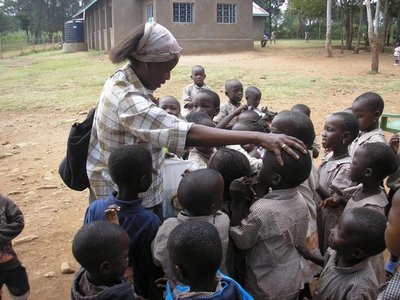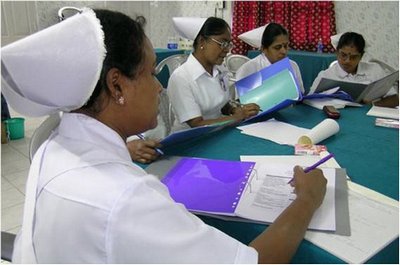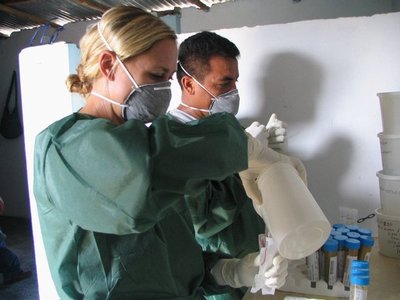June 5, 2008
Improving health through education, research & service
The Department of Global Health is building an infrastructure and a foundation for a complementary and interdisciplinary enterprise that will reach far.
“We will accomplish that through programs that bridge across education, research and service,” said Dr. King Holmes, the William H. Foege endowed chair of the Department of Global Health.
Education
Dr. Stephen Gloyd, associate chair for education and curriculum for the department, said, “Of course we need doctors, nurses, dentists, pharmacists and social workers who can work in resource-limited settings around the world, but we also need engineers, lawyers and business people who can understand health issues within a global context.”
The department offers an array of interdisciplinary degree and certificate programs that allow for flexibility in meeting growing global health needs and interests.
It offers undergraduate courses in global health and a Global Health Pathway in the School of Medicine. In addition, the department offers several tracks in the Master of Public Health (MPH) in global health, including a general MPH track, a Peace Corps Masters International (PCMI) MPH program, and concurrent MPH programs with degrees in medicine, nursing, public affairs, international studies, anthropology, social work, and other graduate degree programs. The department also administers a Ph.D. program in pathobiology and a graduate certificate in global health.
This year, the department will confer academic credentials on 13 MPHs in global health, 10 doctorates in pathobiology, four physicians in the Global Health Pathway, 11 certificates of global health, and recognize three postbaccalaureate fellows, Gloyd said.
The department has become so popular there’s a push for developing both an undergraduate minor and major in global health, as well as a leadership-management track for mid-career professionals in public affairs and public health. A minor, if funding comes through, could begin as early as 2009, and a major would take at least two years of development, said Gloyd.
Research
In fiscal year 2006-07, the UW was awarded $1 billion in grant and contract research and has attracted internationally respected research programs and faculty to work with the department. The Institute for Health Metrics and Evaluation at the UW, supported by a $105 million gift from the Bill & Melinda Gates Foundation and $20 million from the state of Washington, monitors health around the world and provides credible and useful information to enable policymakers and decision makers to craft the best policies for their environments. The Institute is led by Dr. Christopher Murray, an internationally renowned expert in health economics and evaluation.
The International Clinical Research Center (ICRC), with $28 million in projected funding this fiscal year, is conducting two large phase 3 trials of herpes simplex virus-2 suppression, and of antiretroviral pre-exposure prophylaxis in HIV discordant couples, and has developed an associated repository of samples for studying the immune correlates of HIV exposure in HIV discordant couples. The primary focus of the ICRC is to conduct clinical trials and research to prevent HIV infection and other infectious diseases that disproportionately affect people in the developing world. The center has enrolled thousands of research participants at sites in Botswana, Kenya, Rwanda, South Africa, Tanzania, Uganda, and Zambia. The center is under the direction of Dr. Connie Celum, a groundbreaking HIV/AIDS epidemiologist and prevention researcher.
The Center for AIDS Research, with more than $3 million in projected funding this fiscal year, is part of a national consortium of NIH-funded AIDS research centers that work collaboratively with programs in Kenya, Peru, Uganda, Mozambique, and China. The center is led by Holmes.
Service
The Department of Global Health fosters an environment where learning and discovery are intricately tied to service. The department is home to two programs that employ hundreds working with ministries of health, universities and nongovernmental organizations in resource-poor countries all over the world.
The International Training and Education Center on HIV (I-TECH), with more than $50 million in projected funding for this fiscal year, is one of the largest HIV/AIDS training programs in the world. It employs 400 people working in 11 field offices in Botswana, Ethiopia, Guyana, Haiti, India, Kenya, Malawi, Mozambique, Namibia, South Africa and Tanzania. The center is led by Ann Downer, a leader in creating effective training programs that move theory into practice.
Health Alliance International (HAI), with expected expenses of $26 million this fiscal year, works to strengthen the provision of essential services by ministries of health. It also promotes innovative programs and policies that foster social and economic equity.
The alliance has more than 800 employees working in Mozambique, Timor-Leste, Cote d’Ivoire and Sudan. HAI is led by Gloyd and Mary Anne Mercer, pioneers in global health who have focused their careers on changing structures that lead to health disparities.





